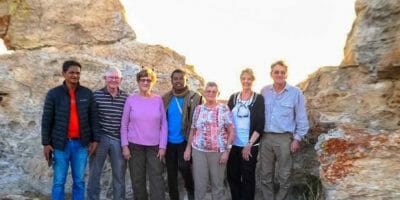The resistance of Madagascar in the face of an economy based on rent: an issue of sovereignty and sustainable development
For several decades, Madagascar has been struggling to get out of the trap of dependence on rent, a situation that weakens its growth prospects and accentuates social inequalities. The island’s economic model, long structured around the enhancement of its natural resources such as vanilla, cloves or nickel, today reveals its deep limits. On the one hand, this accession to immediate wealth allowed certain elites to enrich themselves quickly, while the majority of the population remains at the gates of poverty, under the vulnerability threshold.
Faced with these issues, a collective awareness emerges, emphasizing the need to initiate an economic transformation towards a more resilient model, based on local valuation, innovation and sustainability. Sovereignty -rich in resources must necessarily rely on intelligent strategies – such as the development of a local sustainable development company rather than a simple rent extraction. The objective is clear: to face the challenges of a balanced development, environmentally friendly, while reducing dependence on international aid and the Resource-Driven exploitation.

The risks of an economy centered on rent: Nauru’s experience as a major alert
The emblematic case of Nauru, a small island of the Pacific formerly prosperous thanks to its phosphate mines, illustrates with terror the dangers of a development based solely on the exploitation of natural resources. In a few decades, the promised wealth has evaporated, leaving the territory devastated, on the verge of abandonment, depends deeply on external aid. This sadly exemplary scenario has alerted several states, notably Madagascar, on the need to avoid a similar trajectory.
What this experience is indisputably demonstrates is that rent is not a lever for lasting progress, but rather a force that can, in the long term, exacerbate inequalities and slow down structural investments. The real revolution will involve a global economic diversification, a rational management of natural resources, and above all through an implementation of initiatives mobilizing the whole of civil society.
| Key factors | Consequences if not mastered | Lessons learned |
|---|---|---|
| Resource-Driven exploitation | Rapid decline in wealth, environmental degradation | Strengthen local valuation and sustainable management |
| Economic dependence | Vulnerability to global fluctuations | Develop a diversified economy |
| Governance deficit | Corruption, capital flight, persistent inequalities | Strengthen transparency and local participation |
Nauru’s teachings insistently recall that any dependence on a Resource annuity must be supervised by rigorous governance, investments in training and a localized industrial vocation, rather than by passionate extraction of raw materials.



Concrete strategies for an ethical, sustainable and resilient Madagascar economy
With this in mind, Madagascar must be resolutely committed to a dynamic of structured transformation. The modernization of its agricultural sectors, notably through Malagasy responsible agriculture, constitutes a crucial stage to enhance its local terroirs and know-how. The creation of an industrial sector based on Madagascar local crafts and the development of green ecosystems, such as the Madagascar green economy, will enrich the value chain while respecting the environment.
The development of a support strategy for rent agricultural sectors must be accompanied by strengthening local capacities, increased access to financing and treatment respectful of social and environmental rights. The transition to an economic model based on the green economy Madagascar can only prosper if it is based on participatory and transparent governance, involving all actors.



Entrepreneurial and community initiatives to build a sustainable development company
Innova Madagascar initiatives, which values social and technological innovation, or Terra Madagascar, which advocates development based on sustainability, embody the new generation of change actors. These actors play a decisive role in the implementation of responsible entrepreneurship, aligned with the principles of the Sustainable Development Society. Their vocation is not only economic, but also social and environmental.
- 🌱 Promote theLocal crafts Madagascar in an eco-design logic
- 🌍 Support Sustainable tourism and ethical, especially as part of the Ecotour Madagascar
- 💡 Encourage research and innovation for a Malagasy responsible agriculture and integrated natural resources management
The obstacles to be overcome for a sustainable economic transformation
The path to a Madagascar economy independent of the rent is strewn with challenges. The weakness of governance, creeping corruption, and opacity in the management of public finances braking difficult reforms. Among the major obstacles, also is the lack of involvement of local actors in the design and implementation of programs.
Among the crucial issues are:
- 🔒 Modernization of public governance with increased transparency
- 🤝 The establishment of a sincere partnership between local and international actors
- 📊 The diversification of economic sectors to reduce dependence on extractive resources
- 🛠 The training and specialization of work forces to support this transition
What these challenges reveal is that a real transformation can only accelerate with a strong political will, a citizen commitment and a reformulation of the international intervention model, oriented towards autonomy and endogenous development.
International funding and partnerships: rethinking cooperation for sustainable autonomy
Financial assistance, although necessary, must imperatively evolve to become a lever of sovereignty. Donors and the AFD or the World Bank must support a change in intervention methods, towards more local partnership, more transparency, and an ability to support the emergence of a local sustainable development company.
The key question remains that of a reinvention of governance, capable of federating all the actors around a common project, preventing aid from becoming a factor of illegitimate dependence or enrichment.
Towards a new national conscience: citizen engagement and innovation for a voluntary future
In order for Madagascar to really turn the page on the rent, the population must play a central role in the definition of priorities and the implementation of solutions. Awareness, education, and the valuation of citizen initiatives are essential to create a dynamic of sustainable change. Youth and social entrepreneurship must be highlighted.
- 🌟 Promote the emergence ofLocal crafts Madagascar innovative and eco-responsible
- 🌟 Support theGreen economy Madagascar through participative training and funding
- 🌟 Promote educational programs oriented towards sustainable development and responsible citizenship
Frequent questions about Madagascar’s dependence on rent and its lasting solutions
- Why is Madagascar still dependent on the annuity?
- Because the economy is mainly based on the export of natural resources without sufficient local valuation, coupled with a deficit in governance and an absence of diversification.
- How can Madagascar reduce its dependence on rent?
- By investing in innovative sectors such as responsible agriculture, Madagascar ecotourism, and by building solid local partnerships for transparent governance.
- What initiatives make it possible to accelerate this transition?
- The development of a local entrepreneurial fabric, support for Madagascar craftsmanship, and the implementation of sustainable strategies incorporating civil society.
- What dangers does dependence on rent weigh on Madagascar?
- It accentuates social precariousness, slows down economic diversification, and amplifies vulnerability to external shocks, including fluctuations in the world market.
- How to strengthen economic governance in Madagascar?
- By strong institutional reform, strengthening transparency and more integrating civil society into decision -making processes.
Source: Mondafrique.com











